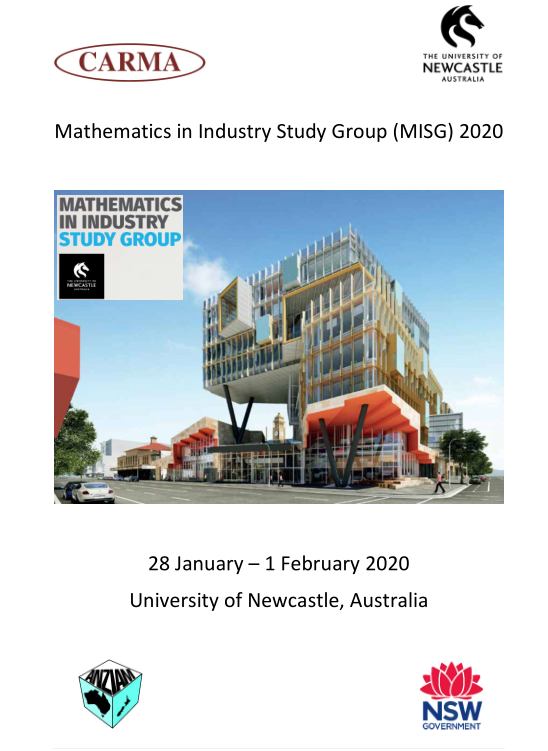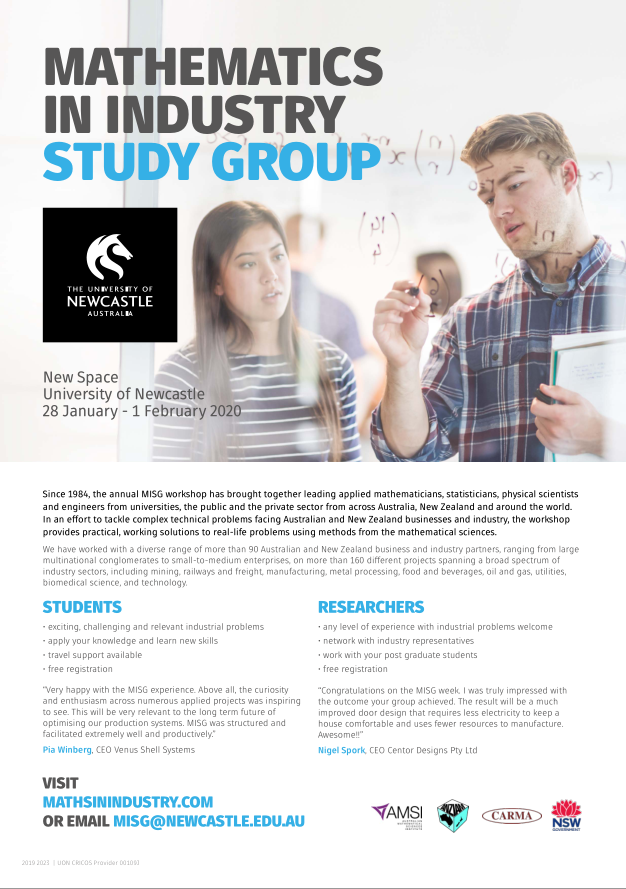As part of MISG, a special public lecture will take place on Friday, 31st January, 2020, in the Hunter Room of Newcastle City Hall (290 King Street, Newcastle; note new venue!). Please register for free to attend this public lecture, and arrive by 5:00 pm for 5:30 pm.
This public lecture is supported by the Royal Society of New South Wales, the University of Newcastle, Australian and New Zealand Industrial and Applied Mathematics (ANZIAM) and the New South Wales Chief Scientist & Engineer Conference Sponsorship Program.
The lecture will be given by Professor Ryan Loxton from Curtin University of Technology on:
Mathematics in Industry: Optimisation in Action – Unlocking Value in the Mining, Energy, and Agriculture Industries
Optimisation is a branch of applied mathematics that focuses on using mathematical techniques to optimise complex systems. Real-world optimisation problems are typically enormous in scale, with hundreds of thousands of inter-related variables and constraints, multiple conflicting objectives, and numerous candidate solutions that can easily exceed the total number of atoms in the solar system, overwhelming even the fastest supercomputers. Mathematical optimisation has numerous applications in business and industry, but there is a big mismatch between the optimisation problems studied in academia (which tend to be highly structured problems) and those encountered in practice (which are non-standard, highly unstructured problems). This lecture gives a non-technical overview of the presenter’s recent experiences in building optimisation models and practical algorithms in the oil and gas, mining, and agriculture sectors. Some of this practical work has led to academic journal articles, showing that the gap between industry an academia can be overcome.
About the speaker: Professor Ryan Loxton
Affiliation: School of Electrical Engineering, Computing, and Mathematical Sciences, Curtin University
Webpage: https://staffportal.curtin.edu.au/staff/profile/view/R.Loxton/
Biography: Ryan Loxton is a professor and the discipline leader for mathematics and statistics in the School of Electrical Engineering, Computing, and Mathematical Sciences at Curtin University. Ryan’s research interests lie in the areas of optimisation, optimal control, and data science. His work has been funded by the Australian Research Council (ARC), the Department of Industry, Innovation and Science and various industry partners, from small start-ups to large corporations. In particular, Ryan’s ARC grants include two prestigious, highly competitive fellowships: an Australian Postdoctoral Fellowship (2011–2014) and a current ARC Future Fellowship that runs until the end of 2021. His work focuses on using advanced mathematics to optimise complex processes in a wide range of applications such as mining, oil and gas, agriculture, and industrial process control. Ryan’s algorithms underpin the Quantum software platform developed by Aurora Global for tracking, executing, and optimising shutdown maintenance operations at mine sites. Ryan is a passionate advocate for industry engagement and has worked extensively with industry where he has led demand-driven research projects with many companies, both big and small, including Woodside Energy, Vekta Automation, Fleetcare and Global Grain Handling Solutions. Ryan was the recipient of the 2018 JH Michell Medal from the Australian and New Zealand Industrial and Applied Mathematics (ANZIAM) as the outstanding researcher of the year, and the 2014 Woodside Early Career Scientist of the Year. Ryan currently leads the optimisation theme in the new Australian Research Council’s Industrial Training Centre on Transforming Maintenance through Data Science, which is funded by a $3.9 million grant from the Australian Research Council plus matched funding from industry partners Alcoa, BHP Billiton and Roy Hill.
![]() Project title: Mathematical Modelling of Pneumatic Conveying. This project has come from industry partners of the University of Newcastle.
Project title: Mathematical Modelling of Pneumatic Conveying. This project has come from industry partners of the University of Newcastle.





